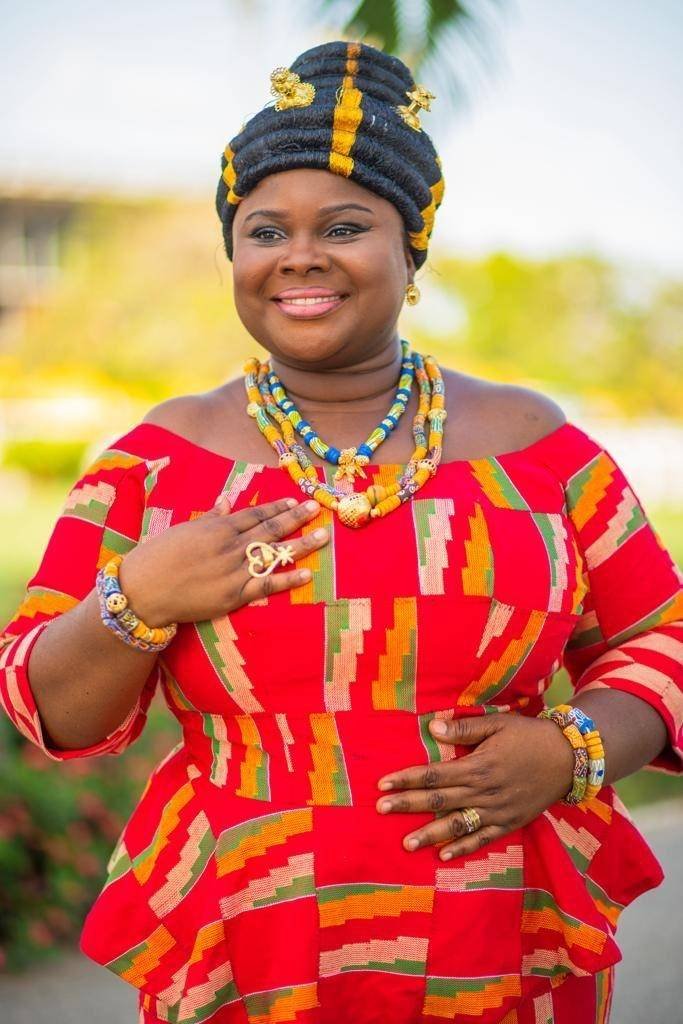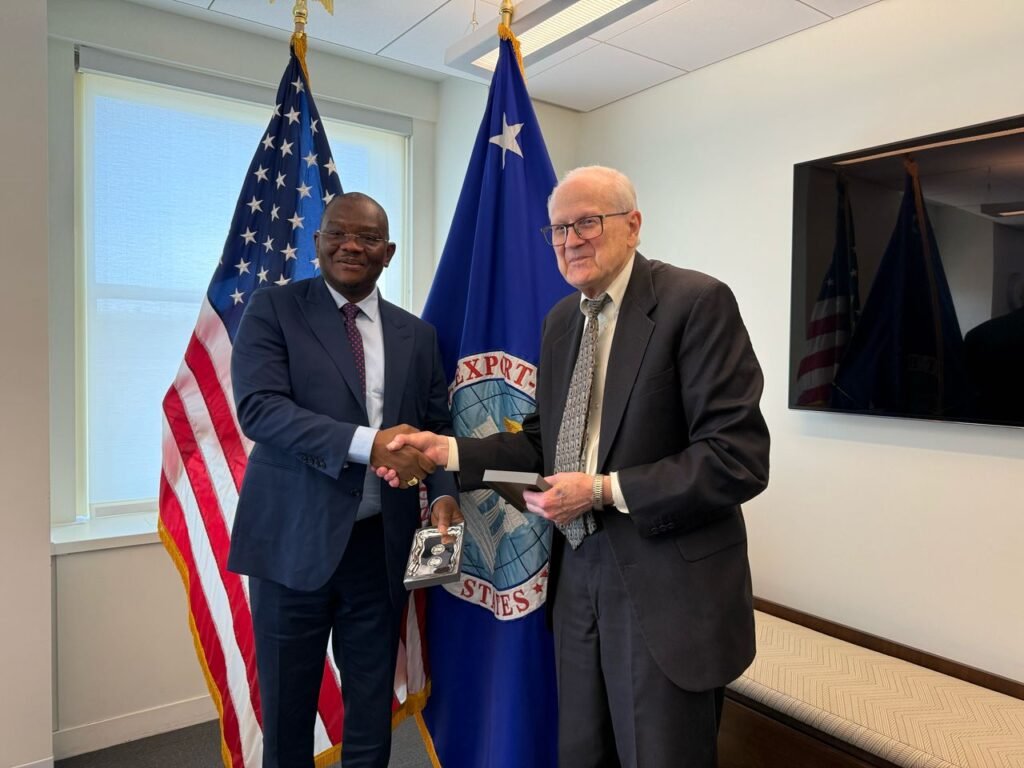Hot!
Gloria Holm-Graves promotes Ghanaian culture in Dubai

Gloria Holm-Graves
In the heart of the bustling COP28 conference in Dubai, a radiant figure emerged, captivating the attention of delegates from across the globe.
Gloria Holm- Graves, a Ghanaian cultural ambassador, stood tall and proud, her vibrant Kente cloth shimmering with gold trinkets, a symbol of her homeland’s rich heritage.

With each step, her elegant Ahenema slippers whispered tales of Ghanaian artistry, and her head-gear, a resplendent Takua adorned with gold ornaments, framed a face that radiated warmth and welcoming spirit.
A smile, as genuine as the Ghanaian sun, adorned her lips, and in her hand, a handmade Kente fan waved gently, a symbol of her nation’s gentle breeze.
Gloria’s presence was a symphony of Ghanaian culture, a melody that resonated with the diverse delegates of COP28.

Her infectious enthusiasm and genuine interest in connecting with others made her a cultural bridge, fostering understanding and appreciation for Ghana’s traditions.
As she gracefully navigated the conference halls, Gloria became a beacon of Ghanaian hospitality, her aura of warmth attracting delegates from every corner of the world.

With each encounter, she patiently explained the significance of her attire, sharing stories of Ghanaian craftsmanship and the deep-rooted cultural values that inspired her nation’s fashion.
Gloria’s charm was irresistible, and requests for photographs poured in. She never declined, her smile as radiant as the gold that adorned her attire.
With each pose, she captured not just a memory but also a piece of Ghana’s heart, leaving an indelible mark on the minds of those she met.
Her presence was so captivating that she became an unofficial ambassador-at-large, virtually invited to every event she graced. Her infectious energy and genuine interest in others made her a magnet, drawing people to her like moths to a flame.

Gloria’s story is a testament to the power of cultural diplomacy, a reminder that sometimes, the most eloquent language is not spoken but embodied.
She represented Ghana with grace, dignity, and a genuine love for her heritage, leaving an indelible mark on COP28 and inspiring Ghanaians worldwide.
Gloria, Ghana’s radiant ambassador, has set a new standard for cultural diplomacy, proving that even amidst the global stage, the simple act of sharing one’s culture with open arms can leave an everlasting impact.
Her story is a beacon of hope, reminding us that cultural diversity is not just a concept but a tapestry of vibrant threads that connect us all.
Hot!
GEXIM deepens relations with US EXIM Bank

A management team of the Ghana Export – Import Bank (GEXIM) led by the Acting Chief Executive, Sylvester Mensah met with the leadership of the Export–Import Bank of the United States (US EXIM) on Wednesday April 23, 2025 in Washington DC, United States of America.
The Acting President and Chairman of US EXIM, Mr. James C. Cruse and Vice President, International Relations, Ms. Isabel Galdiz received the GEXIM delegation, which included Deputy CEO for Banking, Mr. Moses Klu Mensah and Head of International Cooperation, Mr. Jonathan Christopher Koney at the headquarters of US EXIM.

The meeting offered the GEXIM team the opportunity to share the strategic direction of the Bank in line with the resetting agenda of the President of the Republic, His Excellency John Dramani Mahama for the repositioning of the Ghanaian economy into an export-led one by providing the requisite investment to Ghanaian businesses.
Mr. James C. Cruse expressed US EXIM’s eagerness to deepen its existing relations with GEXIM and proposed the signing of a new Cooperative Framework Agreement following the expiration of a Memorandum of Understanding signed in 2019 to utilize US EXIM’s medium term loan guarantees to procure machinery by GEXIM for qualified Ghanaian Small and Medium-sized Enterprises (SMEs).
Mr.Sylvester Mensah thanked the Acting President and Chairman of US EXIM for hosting the GEXIM delegation and reaffirmed the Ghanaian government’s commitment to strengthening trade and investment between Ghana and its global partners for economic transformation of Ghana with GEXIM playing a pivotal role.
The two teams will be meeting on the sidelines of the 2025 US EXIM Annual Conference on 29th and April 30, 2025 to explore possible areas of collaboration and matching Ghanaian businesses to American companies. The meeting ended with an exchange of gifts.
Hot!
Many SOEs have been used as mere instruments for personal wealth accumulation –Pres.Mahama

President John Dramani Mahama has expressed concern over the misuse of State-Owned Enterprises (SOEs) for personal financial gain by individuals in leadership positions.
Speaking during a meeting with Chief Executives of specified entities under the State Interest and Governance Authority (SIGA) on Thursday, March 13, the President directly attributed the dire state of SOEs to their leadership, accusing chief executives, management teams, and governing boards of prioritising personal enrichment over organisational efficiency.
He pointed to bloated budgets, unjustified allowances, and unnecessary expenditures as factors draining public funds while SOEs continue to rely on government bailouts.
“Many SOEs have been used as mere instruments for personal wealth accumulation by appointees. The chief executives, management, and boards of these enterprises are responsible for this situation. Some SOEs have become perennial loss-makers, draining public funds with bloated budgets, unjustified allowances, and unnecessary expenditures while relying on government bailouts as if entitled to them. Many of these entities are at their lowest point in the entire history of the Fourth Republic,” he said.
President Mahama further noted that many SOEs have been plagued by inefficiencies, corruption, and mismanagement, leading to consistent financial losses. He cited the 2023 State Ownership Report by the State Interests and Governance Authority (SIGA), which highlighted systemic inefficiencies and wasteful expenditures within these entities.
He therefore reaffirmed his commitment to reforming under-performing SOEs and ensuring they serve national interests.
He warned that loss-making SOEs will no longer be tolerated and will either be merged, privatised, or closed.
“I will assess you based on your performance. If you do not align with the pace of the reset agenda, you may be asked to step aside. If that adds to the horror movie, so be it,” he added.
Source: Myjoyonline.com







